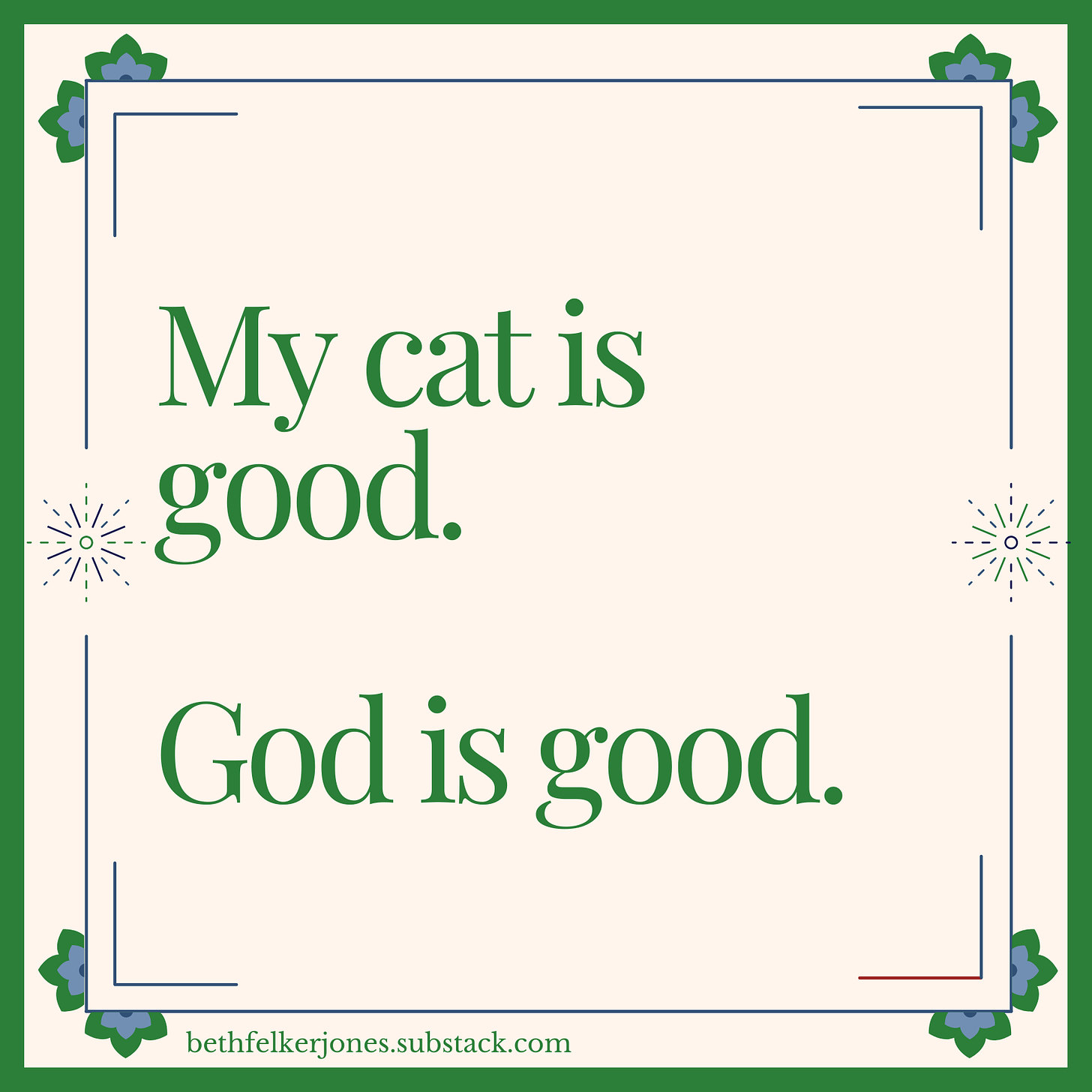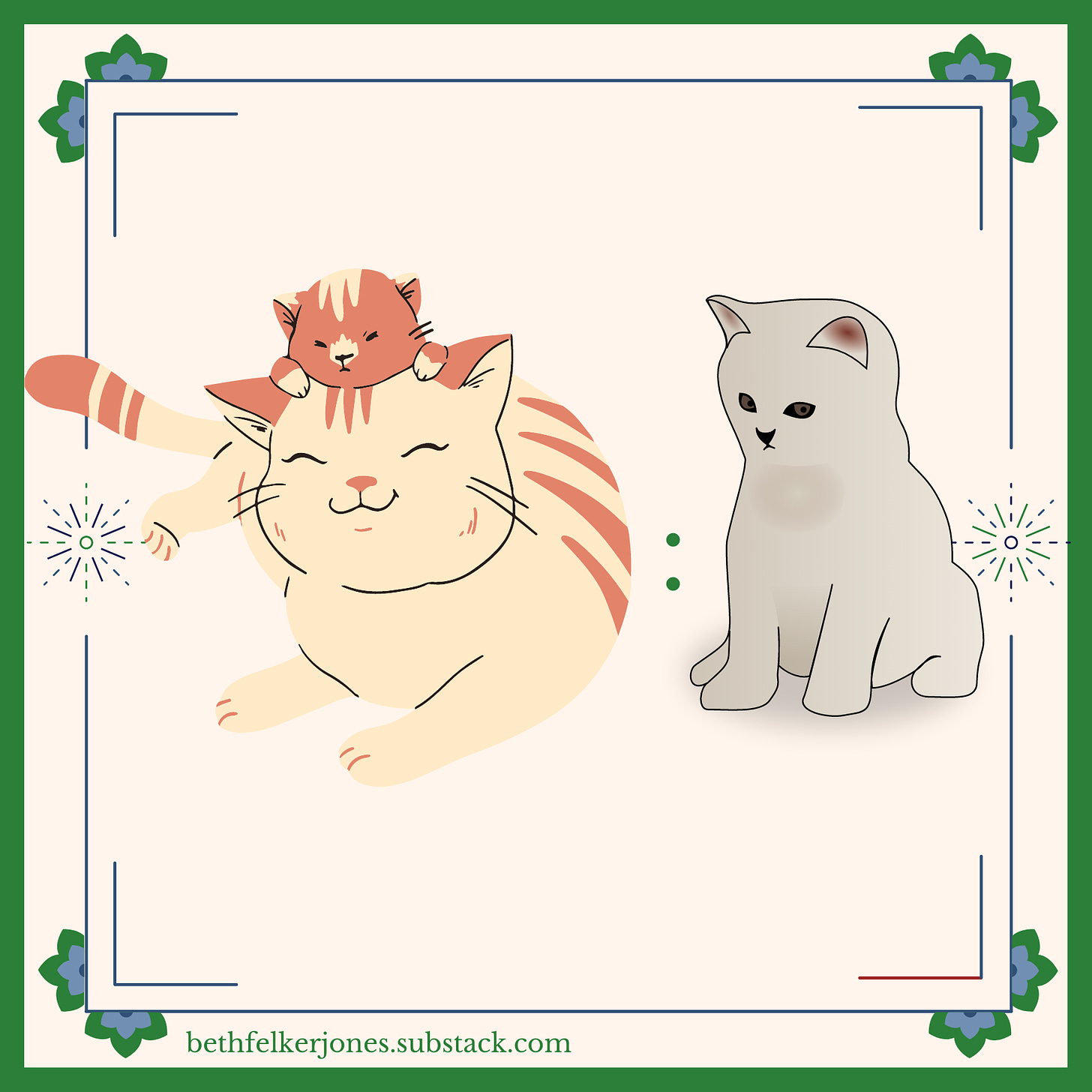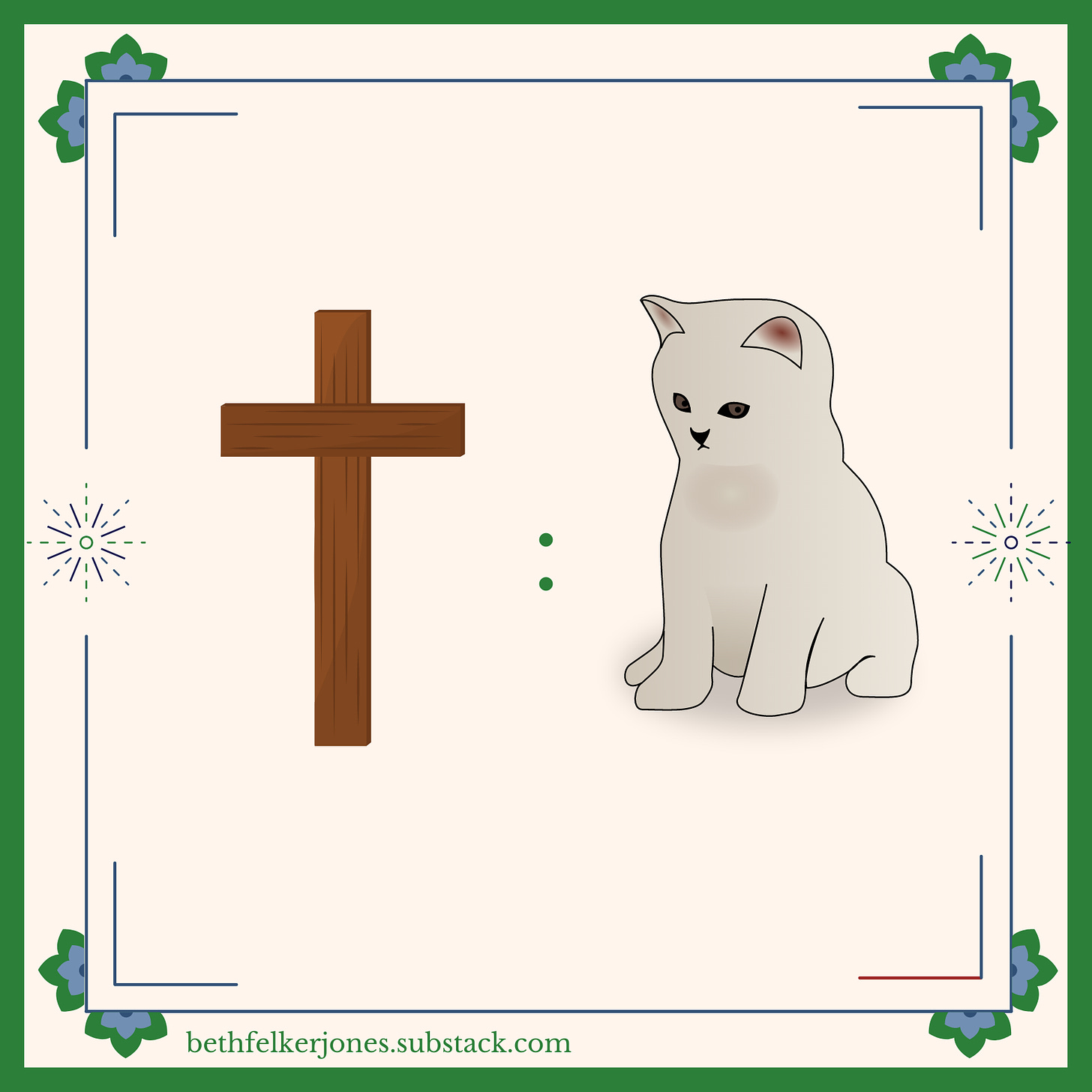Gentle reader,
Welcome new readers!
This piece is the third in a series.
The first part was about the good news that our language for God is analogical: find it here. Part two delved into the richly human meaning making possibilities of analogy: find it here.
Today, the third and final installment of analogy school turns specifically to analogies inviting us to know our very good God. So, pull up a chair, and fire up your analogical imagination.
Scripture uses many analogies for God, and, like all analogies, these both communicate and have limits.
For instance, God is like a rock.
“On God rests my salvation and my glory; my mighty rock, my refuge is God.” Psalm 62:7
This analogy communicates. It tells us something about God’s solidity and trustworthiness. It invokes God’s stability and enduring promises. The aura of the analogy carries with it the smell of wet stone and all the stories from scripture where God’s people set up stones of remembrance to mark places where God has come to their aid and carried them through. It reminds me, too, of the stones of remembrance, gravestones, we set over our loved ones in hope of resurrection.
“Here, I raise mine ebenezer, hither by thy help I’ve come.”
And this rock analogy has limits. God is not like a rock because God is personal and spiritual and eternal, while rocks are impersonal and material and temporal. The analogy’s scriptural aura even teases at that those limits, assigning things to rocks that do not belong to rocks but do belong to our personal God.
So, God says to Moses, “Take the staff, and you and your brother Aaron gather the assembly together. Speak to that rock before their eyes and it will pour out its water. You will bring water out of the rock for the community so they and their livestock can drink” (Numbers 17:8 NIV). While the people feared that God was a barren rock, God turns out to be the rock who sates our deepest thirst. Rocks don’t pour out living water, but God does.
“Oh come, let us sing to the Lord; let us make a joyful noise to the rock of our salvation!” Psalm 95:1
We sing to this rock! And, if persons don’t bear the testimony we’re supposed to bear, well, then, the very “stones would cry out” (Luke 19:40). Rocks aren’t personal, but we are, and what persons do in relation to the personal and yet also still rock-like God is tell the truth about God’s glory.
When we’re talking about the analogy between God and a rock, the limits of the analogy are fairly obvious. But, as we saw in part I of this series, we all too easily forget the limits when we talk about something like the analogy between the goodness of God and the way we ordinarily use a word like “goodness.”
Let’s return to comparing God to my cat. If God is good and my cat is good, how does divine goodness relate to catty goodness?1
All the images in this post were designed on Canva.
The analogy could be a relationship of size. Perhaps God has really big goodness, while my cat has some small portion of goodness.
God’s goodness : my cat’s goodness :: infinity : a little bit
I suspect this is often what we assume about how analogical language for God works, as it makes sense on a very basic level. But there’s a major problem here, and displaying the thing as a picture of a big old cat and a tiny little cat points it out. The difference between God’s goodness and my cat’s goodness isn’t one of mere size.
The big cat/little cat picture underlies many idolatries. So much so that Ludwig Feuerbach dismissed belief in God as nothing more than humans projecting ourselves onto a big screen and then worshiping our own images. Feuerbach is dead wrong if we’re talking about the true and living God, who is more OTHER than we ever could have imagined, but he’s not wrong about our cheap, false idols, and I think this is why so many have found his brand of atheism so persuasive. Who wants to worship a giant cat? Or a giant man?
The Triune God is not a bigger version of humans; the Triune God is magnificent, transcendent, other, holy fire.
Infinite goodness has no size.
If it were the case that God had 98 units of goodness and my cat had two units of goodness, we could suppose that,
God’s goodness : my cat’s goodness :: 98% : 2%
But God doesn’t have units of goodness. God IS infinite, eternal, uncreated, everlasting goodness. God’s goodness is not limited, as though it is a quantity that could be divided into 100 parts. God’s goodness is beyond quantity.
If my cat has any goodness, that catty goodness is from and of God’s goodness. It is not a little bit of goodness that belongs to my cat and not to God. God does not have to yield 2 units of goodness in order for my cat to be a little good, and my cat’s goodness in no way diminishes God’s goodness or competes with God’s goodness.
“all perfections existing in creatures divided and multiplied, pre-exist in God unitedly.” Thomas Aquinas, Summa Theologiae Ia Q. 13, a. 5.
We need a way to think about divine analogies that goes beyond the quantitative and points toward the qualitative.
This tiger/cat analogy is better than the big cat/little cat analogy, as it activates some sense of the mysterious, wild, and powerful qualitative difference between God and us. The tiger isn’t a terrible avatar for the terrible mysterium tremendum et fascinans2 (a little bit of Latin beloved of theologians, which gives you a sense of its meaning even without being translated).
Tyger Tyger burning bright,
In the forests of the night:
What immortal hand or eye,
Dare frame thy fearful symmetry?
But, while I like the tiger analogy’s wildness, it’s too near the big cat/little cat analogy for comfort. (Tigers should discomfit, no?)
We need something else. Perhaps, the analogy between God’s goodness and my cat’s goodness is one of causation.
God’s goodness : my cat’s goodness :: cause : effect
The queen (that’s the title for a mama cat. Isn’t it lovely?) is the cause of the cat. The mama cat is the cause of the kitten.
The limits of the analogy are still important here; queen cats cause kittens out of their very substance, while God causes creation out of nothing, such that creation is qualitatively different from God in a way that kittens are not qualitatively different from their queens. And the queen’s goodness, like the kitten’s goodness, is dependent, while God’s goodness is the eternal truth of God.
“it does not follow that God is good, because He causes goodness; but rather, on the contrary, He causes goodness in things because He is good.” Thomas Aquinas, Summa Theologiae Ia Q. 13, a. 5.
Thinking about analogies of causation, Thomas Aquinas used a now famous example:
The medicine is healthy. The urine is healthy.
The medicine’s healthiness causes the urine’s healthiness. (I won’t try to craft an image for this one!)
medicine : urine :: treatment : disease
“Hence every creature represents Him, and is like Him so far as it possesses some perfection; yet it represents Him not as something of the same species or genus, but as the excelling principle of whose form the effects fall short, although they derive some kind of likeness thereto, even as the forms of inferior bodies represent the power of the sun.” Thomas Aquinas, Summa Theologiae Ia Q. 13, a. 5.
Now this is interesting! If God’s health is like medicine, and the contents of my cat’s bladder are like urine colonized by bacteria, then the analogy between God and my cat goes beyond cause and effect. It is an analogy of healing: an analogy, perhaps, of redemption and resurrection.
If my cat has a urinary tract infection and God heals him, his now healthy urine is an analogy to the health and holiness and righteousness and flourishing and everlasting life that is God.
Cat urine becomes a sign of resurrection.
Does it feel sacrilegious? To suggest that urine might testify to God? Good. That feeling highlights how audacious we are, ever to speak of God using analogies from creation. But God invites this audaciousness, because God has come among us in the flesh. Urine is God’s good creation, and a God who was willing to wear diapers out of for love for us is not offended if we notice that God works in the most mundane, lowly, ordinary things. Swaddling cloths are a sign of resurrection.
Perhaps, given that God is the healer, this may open up another way to think about analogies between created goodness and the divine goodness. It, too, is audacious.
Perhaps the analogy is one of participation.
my cat’s goodness : God’s goodness :: a runner : a marathon
my cat’s goodness : God’s goodness :: an active student : a class discussion
(That one is close to my teacherly heart. The classroom has taught me that participation is not a trophy to be mocked; participation is a beautiful, costly, cooperative, transformative miracle.)
my cat’s goodness : God’s goodness :: Peter : the footwashing Jesus is offering
“Peter said to Him, ‘Never shall You wash my feet!’ Jesus answered him, ‘If I do not wash you, you have no part with Me.’” John 13:8
The only way to talk about God is analogy, but there is—kind of—one exception to this rule. We can also talk about Jesus.
Jesus is not an analogy for God.
Jesus IS God.
When we know Jesus, we know God. Jesus is the context who lets us make meaning of analogical language for God. He’s the aura of every analogy.
Here’s my favorite part; the only way to support the audacious claim that we might participate in the goodness of God is to root that audacity in Jesus. If we are participants in God’s goodness, that participation is made possible by the incarnation, life, death, and resurrection of Jesus.
“Thus he has given us, through these things, his precious and very great promises, so that through them you may escape from the corruption that is in the world because of lust and may become participants of the divine nature.” 2 Peter 1:4
Jesus’s union with the Father in the Spirit is an analogy for my union with Jesus, which enables my participation in the good life of Triune love.
Is my union with Jesus exactly like Jesus’s union with the Father? Of course not. Analogies have limits. But does my union with Jesus open up a whole new way of life, including the possibility of participating in the goodness of the Father, Son, and the Holy Spirit? You bet it does.
Jesus has jumped into the human condition, and because he is swimming in the same pond with us, our analogies can be audacious, daring, and explosive.
If my cat’s goodness participates in God’s goodness, there is no separation between catty goodness and divine goodness, even as there is no possibility of mistaking catty goodness for something other than what it is, created and dependent, impossible outside of relationship to the one who made it and sustains it in love.
An analogy of participation is hard to chart. God’s goodness enables every other goodness. God’s goodness supports every other goodness, every moment. Imagine my cat swimming in the goodness of God. Imagine yourself swimming in the goodness of God, breathing the goodness of God into your lungs, inviting others to jump into the ocean of God’s goodness.
At the end of the day, an analogy is a relationship. And all our analogies for God are Christological.
How do we relate to God’s goodness? We do so through Jesus, who invites us to jump on in, to float, to swim: to accept the goodness of God as more fundamental to our being than the air we breathe.
Is anyone else getting a baptismal aura from this analogy? Come on in, the water’s fine.
Grace and peace,
BFJ
If this piece has been good to you, I’d be grateful if you’d comment, share, or forward.
Announcement: I’ve opened Church Blogmatics up for paid subscriptions.
You are 100% welcome to keep your subscription free,
and free subscribers will continue to receive most posts and retain access to the archive.
If you have the means, consider supporting my work through a paid subscription, which comes with special access to backstage pass posts, the ability to comment and join any conversation, and my heartfelt thanks. If you want paid subscriber benefits, but it doesn’t work for your budget, send me a message, and I’ll make sure you get full access. Click the button below to sign up for paid subscriber access with a special discount (available for the next month).
As always, I’m grateful you’ve chosen to read.
This piece contains associate links.
Are there analogies for God that nourish you? How do they help you to know God? What are their limits? Talk to me in the comments!
Love audio books? Try Audible plus.
Amazon Fresh offers grocery delivery on tens of thousands of products – from a complete grocery selection to everyday essentials, toys, gifts and more. Try it now.
Get a 6 month trial of Amazon Prime for students.
There’s a big, complicated conversation in the theological literature about the right categories for analogies for God and what different thinkers mean when they invoke those categories. Here, I’m playing fast and loose with the categories. Given the limits of analogy and the mysteriousness of God, it would surprise me if we were able to perfectly explain how theological analogy works. If you want more, dig in to Philip Rolnick’s Analogical Possibilities: How Words Refer to God or Steve Long’s Analogia Entis: On the Analogy of Being, Metaphysics, and the Act of Faith.
“The expression mysterium tremendum was introduced by R. Otto as a basic concept in phenomenology of religion; the author translated it as schauervolles Geheimnis, ‘terrible mystery.’”




















This is a fantastic post! Thank you, Beth.
Another great post! You have poked holes in a light-blocking shade to help us begin to see “good” things in a dark room!
And, if “Light” continues to be a characteristic of God, the holes you poked open larger spaces as time passes, sight adjusts, and we discover more!
The power of analogy becomes something very special when we apply new knowledge and our faith-fueled-imagination makes analogies with, say, the darkness and introduction of light in creation, Jesus as “The Light of The World”, and so much more about analogies and God! Thank you!!!
What does a relatively small amount of light do for us in the darkness of night? We get to see the stars we might say are like God’s presence found in glistening cat’s eyes!